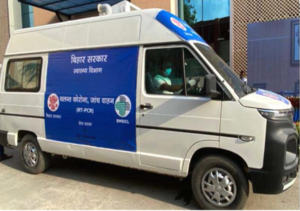Testing for COVID-19 has shown to be vital to lift confinement restrictions and to prepare for any new waves of infection. Strategies for testing more people have been established to suppress local outbreaks, identify people that show immunity to infection, and to gain insights into the evolution of the pandemic. Boule’s distribution partner Q-Line Biotech (former POCT Services) in Lucknow, India has received many honorary awards for contributions to improving public health in India. One of the later initiatives is mobile vans for coronavirus virus testing with 24-hour report turnaround time (which achieved the target of 100 percent efficiency), to support RT-PCR investigation of SARS CoV 2 virus spread out in the villages. An initiative completely in agreement with Boule’s own vision to improve health for everyone, everywhere.

We asked Mr. Saurabh Garg, Chairman of Q-Line Biotech, how he sees the post-pandemic development of such a patient-centric approach.
Q. How do you see ambulatory testing services develop – will there be a need to be able to reach out to rural areas with testing services also in the future?
A. India is the second most populous country in the world, with over 65 percent population concentrated in rural areas where healthcare facilities are not adequate. The health facilities in India have a difference when it comes to rural and urban areas. The government of India is constantly working to improvise and strengthen upon the health infrastructure in rural areas through various schemes and initiatives like, namely PM-Ayushman Bharat Health Infrastructure Mission (PM-ABHIM), Ayushman Bharat Health & Wellness Centres (ABHWCs), Pradhan Mantri Jan ArogyaYojana (PMJAY), and National Digital Health Mission (NDHM).
Even post-COVID, government is proactively working to improvise the healthcare infrastructure and for outreach of services to outskirt and remote areas through mobile laboratories and clinics.
POCT Services has also recently submitted a proposal for “Lab on Wheels” to the Bihar state government. A population-based initiative for prevention, control, and screening for common non-communicable diseases (NCDs) i.e., diabetes, hypertension, and common cancers has been rolled out in the country under the National Health Mission as well as a part of Comprehensive Primary Health Care. Under the initiative, persons more than 30 years of age are targeted for their screening for the common NCDs.
A part from this, contagious infectious and waterborne diseases such as diarrhea, amoebiasis, typhoid, infectious hepatitis, worm infestations, measles, malaria, tuberculosis, whooping cough, respiratory infections, pneumonia, and reproductive tract infections dominate the morbidity pattern, especially in rural areas.
Therefore, given that the country is already hit by various strain of COVID infection, that is, the pandemic, which is still prevalent apart from the need to cater to effective diagnosis for various communicable and non-communicable lifestyle diseases.
I believe that the ambulatory testing services are a must, as it can ensure on a wide scale, access to good quality preventive health care services without anyone having to face financial hardship as a consequence apart from also making certain the attainment of the highest possible level of health and well-being for all.

Mr. Saurabh Garg, Chairman of Q-Line Biotech
The initiative is also cardinal as it ensures bridging the rural-urban divide and by securing last mile healthcare due to doorstep collection or mobile clinic/lab services. Thus, it is an endeavor to fulfil the nation’s vision for accessible, affordable, patient centered quality of care as also envisaged in the National Health Policy. Therefore, it is imperative for effective and timely diagnosis, prognosis, and treatment.
Q. What do you think such ambulatory testing services will include – which tests would be relevant?
A. All the pathological tests related to communicable and non-Communicable diseases would be relevant for example:
Complete blood count (CBC): It is used to diagnose anemia, infections, certain types of cancer, and so on and comprises WBCs, RBC, hemoglobin, hematocrit, mean corpuscular volume, platelets, Thalassemia*, and other blood measurements. It’s especially important for Indian women, as they tend to suffer from iron-deficiency and may require supplementation.
Anemia is a major public health problem in India, which affects over half of the population in almost all age groups. It has a devastating effect on human health and affects the overall socio-economic development apart from adversely affecting the health of women under reproductive age group who are the most vulnerable in terms of iron deficiency anemia (IDA). Therefore, to give impetus to eradicating such problems in India especially at rural and or deficient areas, ambulatory testing services have become an inevitable necessity with hematology as a key component.
Blood sugar test: Done after a 12-hour fasting period, this helps detect diabetes. In cases of pre-diabetes and diabetes, an additional test, HbA1C that indicates the average blood sugar levels over the previous 3 months is done.
Lipid profile: It is an accurate indicator of heart health. This blood test measures the total cholesterol, triglycerides, and HDL, and LDL levels.
Liver function test: This is done to screen for liver conditions, such as alcohol-induced liver damage, fatty liver, hepatitis C and B.
Urine analysis: It checks for presence of proteins, sugar, and blood in the urine sample, which could indicate kidney disease, among other conditions.
Kidney function test: A high reading of serum creatinine may indicate impaired kidney function.
Thyroid function tests: These blood tests are important in detecting underactive (hypothyroidism) or overactive thyroid (hyperthyroidism).
Test for vitamin D deficiency: An extremely common condition, which increases the risk of bone loss and osteoporosis in later years, among other things.
Electrolyte and Coagulation Tests.
Screening of basic body vitals: for example, measurement of body weight and height, blood pressure, pulse, temperature, and eye care, is also envisaged for complete health examination.
Q. What demands will an ambulatory testing service put on the test equipment?
A. The ambulatory testing services require the basic testing equipment like semi-automatic biochemistry analyzer, 3-part hematology analyzer, coagulation analyzer, electrolyte analyzer, rapid cards, and point of care devices. A complete health examination shall comprise pulse oximeter, glucometer, scale (for body weight), blood pressure machine, digital thermometer, ECG machine, digital stethoscope, digital scope (ophthalmoscope, endoscope, otoscope), fundus camera (retinoscopy), apart from the following as outline below:
• PE foam and proper shock absorber to minimize the risk of hardware failure.
• Functional AC and optimum temperature.
• Centrifuge.
• AI-based mobile application software, which shall comprise a record of complete patient history and treatment related data and profile.
• UPS Backup or pure Sine wave supply 220v/50hz.
* Mentzer index as calculated by mean corpuscular volume per red cell count can be helpful in distinguishing the thalassemia trait from iron-deficiency anemia: < 13 suggests thalassemia, > 13 suggests iron deficiency.




